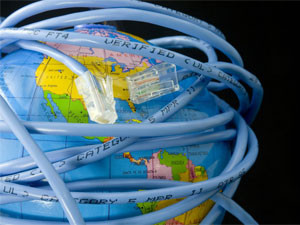
South Africa's MTN and Telkom are among five telecoms operators worldwide that have signed a memorandum of understanding (MOU) with the intention of constructing a new submarine cable system, called Africa-1.
The consortium claims the cable will be the fastest and most reliable connectivity between Africa, the Middle East and South Central Asia. Construction is expected to begin later this year and be ready for service by late 2017.
The other operators involved are Saudi Telecom Company, Telecom Egypt and PCCW Global, based in Hong Kong. Other carriers are expected to join at later stages.
The cable will extend more than 12 000km along Africa's east coast towards Saudi Arabia, Egypt and Pakistan, with up to an additional 5 000km for branches.
Africa-1 will have at least a three-fibre core and use 100G technology, according to a PCCW Global statement. It will be equipped to accommodate several terabits of capacity from the first day. It will also offer interconnection with other cable systems and open access at all cable landing points.
The consortium members have access to landings at all major cable systems in the Middle East, which will facilitate connectivity between Africa-1 and the rest of the world.
Price drop
Africa Analysis analyst Dobek Pater says the benefits of such a cable may include lower pricing of retail data and broadband-based services.
"The price of broadband (fixed plus mobile) continues to decline continuously, although more recently it has seen some reversal due to the low value of the ZAR vis-`a-vis major global currencies used to purchase network equipment by most of the operators/service providers in the local market."
He says the decline in retail prices of data and broadband-based services are the result of competition.
"Investment in the Africa-1 cable will allow investors to decrease their cost of international bandwidth provision due to the fact that the new cable offers a lower cost per unit of international capacity. (Due to technological evolution, an operator can buy into more bandwidth for less with each new cable deployed.) The lower unit cost to the operators means they can continue competing on price."
Africa rises
Africa-1 will complement existing cables now nearing their mid-life, says John Unterhorst, a group executive from MTN Group.
"It will ensure future resiliency and capacity requirements for the explosive digital broadband future so vital for Africa's economic and social development," says Unterhorst.
Telkom managing executive of network engineering and build, Casper Kondo-Chihaka, says Africa-1 will complement existing high-bandwidth cable systems in the region.
"Africa-1 will provide more diversity for the large volume broadband traffic from SA to the rest of the world. This cable will provide the means to fulfil our role as champions of national broadband access and act as catalyst to stimulate further penetration of Internet connectivity for the entire country," says Kondo-Chihaka.
"We believe that with its effective connectivity with the rest of the world, Africa-1 can become an important enabler and contributor to the economic progress of Africa in the coming years," says Homoud Alkussayer, Saudi Telecom Company VP.
Telecom Egypt CEO Tamer Gadallah says: "The addressable market of African wholesale bandwidth customers is more promising than in many other regions. The weakness of the continent's international bandwidth is due to the lack of new systems coming into Africa to enhance the competitiveness of the African market."
Cable troubles
Pater says the Africa-1 cable could provide better quality services and greater stability through greater international connectivity redundancy. "For example, there will be fewer interruptions to services through cable breaks."
Early this year, undersea cable operator Seacom experienced multiple outages which left most of Africa without Internet connectivity for hours at a time. To exacerbate the problem, the West Africa Cable System, which Seacom uses as backup, went down at the same time.
The company blamed civil construction activity in Egypt for the outages. Seacom has since successfully fixed its terrestrial network that experienced the glitches in the North African country.
Share